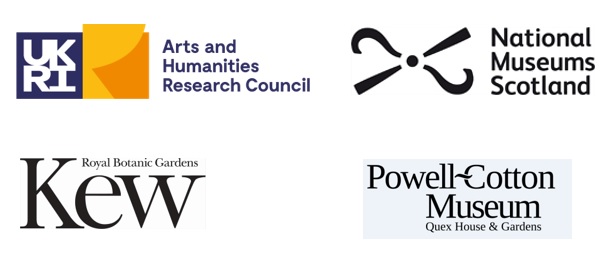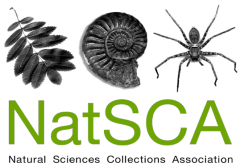People and Plants
'People and Plants: reactivating ethnobotanical collections as material archives of Indigenous ecological knowledge' - AHRC funded networking grant
NatSCA is pleased to support this one year project led by National Museums Scotland, Royal Botanic Gardens Kew and the Powell-Cotton Museum. The project is funded by the Arts and Humanities Research Council (AHRC) and starts in January 2022. There will be opportunities for NatSCA members to apply for funded spaces at project workshops – please see details of the workshops below; details on how to apply will be shared through the NatSCA network.
Investigating the interplay between natural history and ethnography collections, the project will build on a re-emerging interest in indigenous ecology and the value of ethnobotanical collections as material archives of indigenous ecological knowledge.
Situating itself within current debates on decolonising the practice and method of museum work, the project aims to create a conversation between academics, researchers, museum professionals, botanists, and indigenous knowledge holders to establish the relevance of these collections in the present, and their potential applications for the future.
Medicinal collections display at the Powell-Cotton Museum
© Powell-Cotton Museum
Project Aims
• To bring academics and curators together with artists and knowledge holders from specific originating/diaspora communities in Australia, Somalia and Brazil, to create a strong network and to explore the ways in which stakeholders engage with and care about the material archives of biocultural collections.
• To consider in what ways historic collections of ethnobotany contain, represent and preserve indigenous ecological knowledge.
• To generate a better understanding of how such collections can be rendered versatile, as research and knowledge resources for indigenous and non-indigenous stakeholders to address current cultural and environmental concerns.
• To explore the ongoing significance of ethnobotanical collections and the implications this has for the ways in which these collections are catalogued, made accessible, cared for and displayed.
Workshops
Three one-day workshops will be held during 2022 at the project institutions. The workshops will have a maximum of 20 participants to ensure productive discussion. In addition to a core group of attendees, five spaces in each workshop will be made available to other interested parties, which may include student researchers, museum researchers, community members, ecologists, and academics.
Four spaces will also be allocated to professional museums staff who are members of the Museum Ethnographers Group (MEG) and/or the Natural Sciences Collections Association (NatSCA). Interested participants will be required to write a short statement outlining their interest in the workshops and their reasons for wanting to attend.
Somalia
Powell-Cotton Museum March 2022
This workshop will be run in partnership with the School of Anthropology and Conservation at the University of Kent and the NOMAD project, which works with engaging Somali communities in heritage projects. Discussions will consider the salience of ethnobotany specimens for diaspora communities today (particularly women) and how these narratives can be embedded into museum processes such as cataloguing, display and outreach. It will use the Diana Powell-Cotton collection (1934-35) from Somalia as its case study, which includes a distinct sub set of medicines for issues of women’s and children’s health.
Programme:
9.30-10.00 Welcome and housekeeping
10-10.15 Introduction to People and Plants
10.15-11.30 Introduction to the Powell-Cotton Museum and time to explore the Museum
11.30-13.00 short papers
Abira Hussein, NOMAD project/University College London:
‘The potential role digital technologies can have in pluralising curation, and the role of diaspora knowledge in challenging and informing museum practice’
Rosa Dyer, Pitt Rivers Museum/Birkbeck College:
‘Initial explorations of the Somali ethnobotanical collection at the Powell-Cotton Museum’
Inbal Livne, Powell-Cotton Museum:
‘Community engagement and decolonising the catalogue’
13.00-14.00 Lunch
14.00-16.00 Discussion in the collections; how can these collections be useful beyond the museum?
16.00-16.30 Wrap up and next steps
18.00 Dinner, Margate.
The workshop talks can be viewed here:
People and Plants - YouTube
Brazil
Royal Botanic Gardens, Kew
This workshop will be run in partnership with the Department of Cultures and Languages, Birkbeck, University of London and Museu Goeldi, Brazil. Discussions will be centred around the ecological value of ethnobotanical collections, including a focus on the interaction of western botanical nomenclature and traditional knowledge which forms the basis of an existing British Academy Knowledge Frontiers project. The Richard Spruce collection (1849-1864) will be the basis of a case study for how culture, plants and environment in the northwest Amazon have changed over the last 160 years.
Australia
National Museums Scotland
This workshop will be Australia focused, using the collections brought together by Dr Emile Clement (1895-1900) as a case study to explore the potential of ethnobotany collections to be used as resources by Indigenous communities in cultural revitalisation projects, for teaching and/or for artistic practice.
Project Team
The project is led by Dr Ali Clark, National Museums Scotland and Professor Mark Nesbitt, Royal Botanic Gardens, Kew, with the Powell-Cotton Museum as a project partner alongside the Museum Ethnographers Group and the Natural Sciences Collections Association.
The project is supported by an advisory group which includes Dr Rajindra Puri, University of Kent, Professor Luciana Martins, Birkbeck, Dr Jilda Andrews, Australian National University, Isla Gladstone, Bristol Museum and Art Gallery and Dr Johanna Zetterstrom-Sharp, Horniman Museum and Gardens.

There is currently no content classified with this term.
